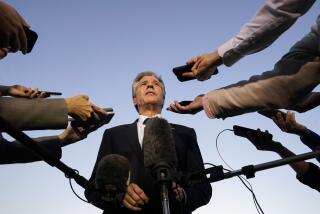Baghdad Attempting to Curry Favor With Neighbors
- Share via
DOHA, Qatar — As President Bush tried to rally the American people Monday behind his tough stand toward Saddam Hussein, the foreign minister of Iraq arrived here on a mission to convince Persian Gulf nations not to cooperate with a U.S. strike against his country.
Qatar is the final stop by Foreign Minister Naji Sabri on a trip to Iran, Oman, the United Arab Emirates and Bahrain. His message has been constant throughout the trip: The U.S. and Israel are the true “axis of evil,” and any U.S.-led strike against Iraq should be regarded as an attack on all Muslims.
But if Hussein and Sabri had hoped for active opposition by Persian Gulf nations to the idea of a strike by the United States to force a regime change in Baghdad, the trip has fallen far short.
The ruler of Bahrain, Sheik Hamed ibn Isa Khalifa, told Sabri that Hussein’s government must comply with United Nations resolutions adopted after the 1991 war over Kuwait and “spare the area from all risks and tensions.”
Much the same message was expected to be delivered by Qatar’s emir, Sheik Hamad ibn Khalifa al Thani, and his ministers.
American military personnel, planes and other weaponry stationed at several locations in the Persian Gulf would be integral to any U.S. attack on Iraq aimed at ousting Hussein.
Qatar’s Hamad has approved the expansion of an air base to accommodate U.S. warplanes and possibly a command-and-control center. Bahrain is the home of the U.S. Navy’s 5th Fleet, and an air base under construction in Oman could accommodate U.S. bombers and refueling planes.
Ron Bee, senior analyst at the UC San Diego-based Institute on Global Conflict and Cooperation, said he was not surprised that Sabri was getting a cold shoulder from Persian Gulf nations.
“You have a growing world opinion that is skeptical about Iraq and 11 years of Iraq ignoring U.N. resolutions,” Bee said. “Why should they believe anything from an Iraqi diplomat? Lip service is about the best they can expect.”
In Iran, Sabri gave President Mohammad Khatami a letter from Hussein “concerning the improvement of our bilateral relations.”
But Iranian media said Khatami lectured Sabri about Iranian prisoners who still have not been repatriated from the Iraq-Iran war of the 1980s. Sabri arrived in Tehran just as Iran completed its annual commemoration of the start of the war. An Iranian newspaper that often reflects the government’s views said that “the only thing Naji Sabri’s visit would accomplish for us is to associate Iran with a regime that is in its dying days.”
As U.S. and Iraqi public relations heated up, Iraqi Deputy Prime Minister Tarik Aziz said last week in Turkey that Iraq would not attack any Muslim country.
The comment was thought to be aimed at lessening tension with Kuwait, where many believe that Iraq will attack again if the U.S. launches a strike. The U.S. maintains an air base in Kuwait where some of the U.S. warplanes that enforce one of the two “no-fly” zones over Iraq are based.
No U.S. officials are scheduled to visit the region, but British Foreign Secretary Jack Straw will visit Iran, Jordan, Kuwait and Egypt with the message that Hussein is a danger to their governments.
More to Read
Sign up for Essential California
The most important California stories and recommendations in your inbox every morning.
You may occasionally receive promotional content from the Los Angeles Times.













